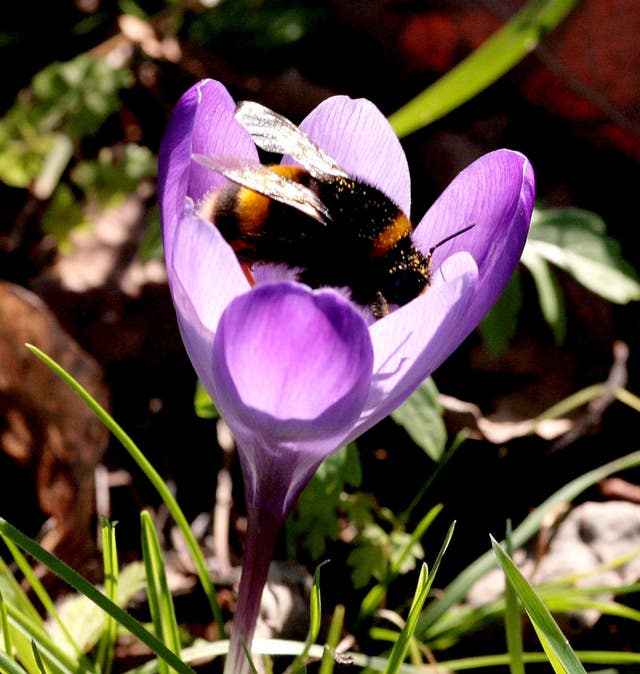
The unseasonably warm weather has prompted birds to try nesting, butterflies to emerge and hedgehogs to come out of hibernation early, experts said.
Migrant swallows and house martins have even been spotted arriving in the UK more than a month early, the RSPB said.
Conservationists are warning the early start to spring, which they say could be linked to climate change, could lead to a “real crisis” for nature if the weather reverts to colder conditions, such as those seen in March last year.
The warning comes after the UK saw the warmest winter day since records began, with temperatures topping 20C (68F) in several places on Monday, and forecasts suggesting the mercury could rise to near-records again on Tuesday.
The RSPB’s wildlife team has been getting calls from people reporting early nesting attempts and even ducklings being spotted across the country.
There are also reports of hibernating hedgehogs and some reptiles waking up earlier than usual and butterflies emerging prompted by the warm weather.
Birds are travelling ahead of the “Saharan plume” of warm air which is bringing the mild temperatures to the UK, with reports of swallows and house martins in Cornwall, Devon and South Wales weeks early, the RSPB said.
Martin Harper, the charity’s director of global conservation, said: “While the warm weather, bright sunshine and abundant sights and sounds of nature undoubtedly make us all feel better, they should also ring alarm bells.
“The early signs of spring are likely down to climate change, which is bad news for us all.
“As we expect the weather to return to temperatures more traditionally associated with this time of year – as they are forecast to – then there could be a real crisis for our birds, insects and other wildlife.”
The Woodland Trust’s Nature’s Calendar scheme, which asks the public to track signs of the seasons, has been receiving unusually early records of spring this winter – with some as early as November.
Mild weather has led to records in January of red admiral, small tortoiseshell and peacock butterflies and queen wasps, which are usually seen in mid to late February or early March.
#Brimstone butterfly records are fluttering in on #NaturesCalendar! The sunshine over the weekend meant we received over 100 records of brimstone first recorded – wow! Don't worry if you haven't seen one yet, it won't be long. https://t.co/N9fGowegfz pic.twitter.com/gKv3FwafXx
— Woodland Trust (@WoodlandTrust) February 26, 2019
Trees including field maples and European larches have been bursting into bud early and blue tits have been spotted making nesting attempts as early as Boxing Day.
The latest bout of unseasonably warm weather has seen more than 250 records of brimstone butterflies emerging for the first time since February 12, with 163 of the sightings taking place since Friday.
The butterfly normally comes out around March or April, the Trust said.
Abi Bunker, director of conservation and external affairs at the Woodland Trust, said: “Nature’s Calendar data has increasingly brought into question the way we think about the seasons and to see spring in December no longer seems unusual.
“With butterflies, bumblebees and snowdrops being recorded across the festive period, we may have to start featuring different species on our Christmas cards.

“But the Nature’s Calendar project is more than just spotting the seasons; data sent in by members of the public enables greater understanding of the repercussions climate change has for our beloved flora and fauna, and of the need to act to tackle global warming and other threats to our wildlife.”
Dr Jo House, from the University of Bristol, said that while the variability of the weather made it hard to link a single event to climate change, it was warming the system and making events like the current winter heat more likely.
While it was “lovely” to see daffodils and swallows arrive, the cold was necessary to control many pests and diseases.
And a fall in temperatures and a return to cold wet weather in March could hit flowering plants and insects, affecting food for early migratory birds, she said.
“It can put nature’s cycles out of sync. When climate is changing rapidly, and weather becomes more unpredictable, it is harder for plants, animals, farmers and gardeners to adapt,” she said.


Comments: Our rules
We want our comments to be a lively and valuable part of our community - a place where readers can debate and engage with the most important local issues. The ability to comment on our stories is a privilege, not a right, however, and that privilege may be withdrawn if it is abused or misused.
Please report any comments that break our rules.
Read the rules here